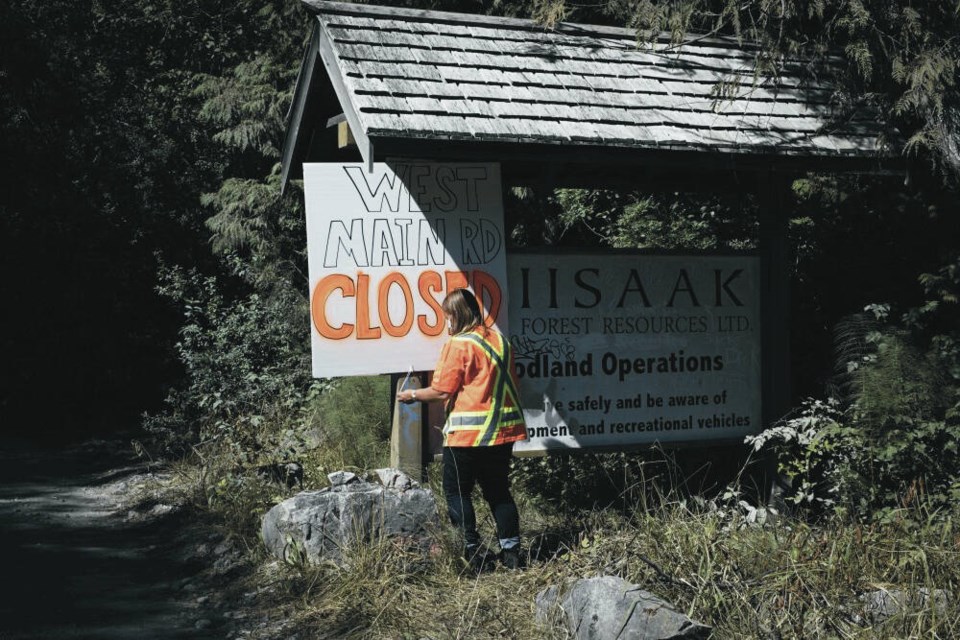Tla-o-qui-aht First Nation in Tofino is calling on leaders on Vancouver Island’s west coast to come together to tackle the shortage of affordable housing in the region, which it says has cost their members the ability to return to live in their homelands.
Meanwhile, visitors looking for an affordable place to camp are lucky to find a $200 site. Without anywhere to go, many are setting up camp on the back roads around Kennedy Lake.
Instead of focusing on “progressive stewardship priorities,” Tla-o-qui-aht Tribal Parks Guardians are using their resources to patrol 40 kilometres of back roads around Kennedy Lake every day in the summer, says a statement from Tla-o-qui-aht’s hereditary chiefs and elected council this week.
Saya Masso, Tla-o-qui-aht natural resources manager, said the guardians hope their education and awareness efforts will instill visitors with a sense of social responsibility to not leave garbage behind.
Tla-o-qui-aht member Timmy Masso organized a road closure of West Main Forest Service Road last summer to evict campers and block tourists from accessing the area in response to the amount of refuse being left behind and concerns over illegal campfires.
Masso hoped shutting down the road would draw attention to the environmental and health risks, encouraging regional leaders to come together to find a solution.
The District of Ucluelet responded by providing the nation with $20,000 towards its stewardship efforts.
Ucluelet Mayor Mayco Noel said in the fall the district would review how the money was spent and look at providing annual funding to support the guardians’ stewardship of the Kennedy Lake back roads.
John Jack, the Alberni‐Clayoquot Regional District board chair and a Huu-ay-aht First Nation council member, says a lot of the responsibility when it comes to how Crown land and First Nations territory is used comes down to how it’s being cared for by the province. “Outside of Tla-o-qui-aht’s specific reserves or treaty lands, it’s still the responsibility of the Crown to handle this in a way that makes sense. And that hasn’t occurred yet.”
Jack said the district has limited funding to enforce anything in the area.
The back roads around Kennedy Lake are also subject to multiple jurisdictions, including Tla-o-qui-aht, the regional district and Parks Canada, he said.
“Because of all these overlaps, we are really trying to take on a convener-type [approach] of bringing people together to have conversations about what we can do to organize a response to not only the illegal camping and the overflows that exist, but the impacts of garbage and human waste that are accumulating.”
While these are necessary conversations between regional leaders, Jack said they all lead back to the housing crisis.
Despite having a population of only about 2,000 residents, Tofino draws around 600,000 visitors every year.
In 2021, 191 short-term rental and 43 bed and breakfast business licenses were active in Tofino, according to the municipality’s annual report. Similarly, 94 bed and breakfast licenses in residential properties were active in Ucluelet last year.
Saya Masso says some of the blame for lack of housing in the area should fall on Airbnbs that have taken “a lot of housing stock away from the region.”
Jack said action is needed by the province in terms of planning and zoning communities to allow for more housing to be built, with higher density on established lots.
The District of Ucluelet is currently considering changing bylaws to prioritize long-term residential housing by limiting nightly rentals in residential neighbourhoods. The bylaw changes would remove bed and breakfast as the permitted secondary use for all single-family residential zones.
“Homes that are in residential neighbourhoods should not be rented out as a nightly rental — that’s a commercial enterprise,” said Noel, noting he’s aware many residents rely on nightly rental income to pay their mortgages.
“We’re playing with these ideas and really going out into the community to see what they would like to see happen.”
Tla-o-qui-aht First Nation has called on Tofino to put a cap on the current level of short-term rental business licences.
The District of Tofino wrote in an email that it will “continue working with Tla-o-qui-aht First Nation and regional partners, as well as the provincial and federal governments as appropriate, to address both regional housing needs and backcountry camping concerns.”
The median cost of a one-bedroom rental unit in Tofino and Ucluelet rose by 71 per cent between 2017 and 2020 to $1,200, according to the 2021 Clayoquot Biosphere Trust’s Vital Snapshot report. Rents for two-bedroom units increased six per cent to $1,480, and three-bedroom units surged by 38 per cent to $2,200.
Meanwhile, the assessed value of a single-family residential home in Tofino increased by 25 per cent between 2019 and 2021 to $956,000.
The Tofino Housing Corporation, a private entity owned by the District of Tofino, is aiming to deliver 150 rental units and 30 price-restricted, locally owned homes to Tofino by 2030.
It recently completed a 14-unit affordable housing project, named Creekside.
The one-bedroom units are being rented from $854 up to $1,100 per month, the two-bedroom units are priced between $1,080 and $1,550, and the three-bedroom units cost between $1,200 and $1,703.
As for visitors, the Tla-o-qui-aht First Nation is proposing that a fully serviced overflow parking lot, modelled after those in tourist destinations such as Whistler and Banff, be established near the Tofino airport to provide safe and sanitary overnight parking for travellers without anywhere else to go.
The nation is also suggesting that a permanent campsite at Čuuis (Rainbow Beach) be established and that a regional housing plan that addresses the needs of those affected by the housing crisis be developed and implemented.
“We need to do better,” said Saya Masso. “The current plan is not working.”



